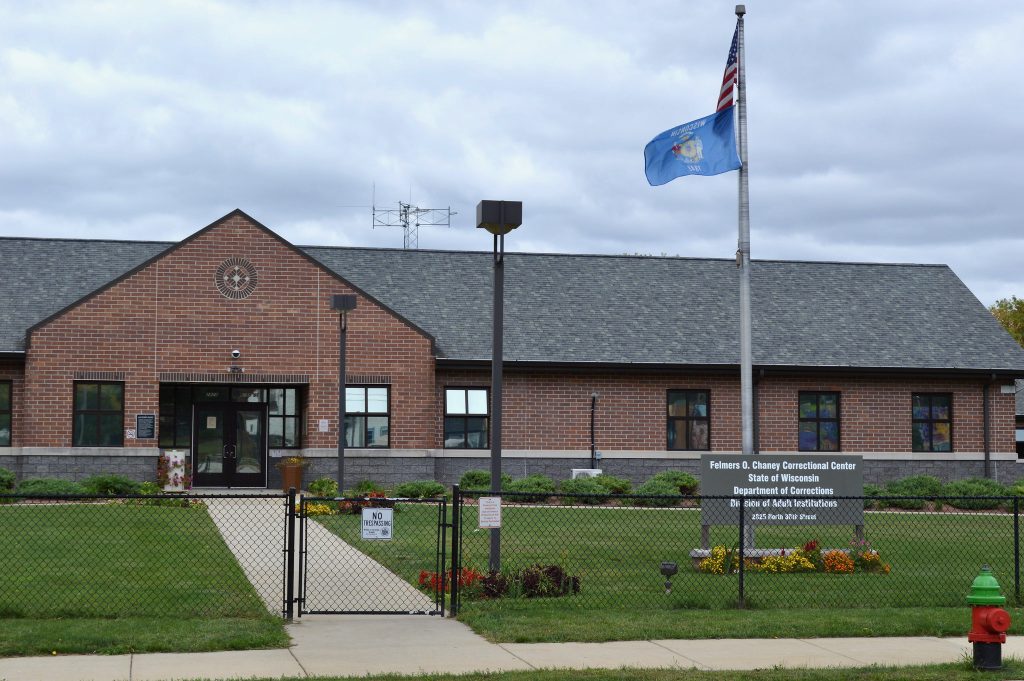Still No Facility To Replace State’s Youth Prisons
Two deadlines to close the prisons have been missed, and plans for new facility have stalled.

The Felmers O. Chaney Correctional Center, 2825 N. 30th St., is being considered as a possible location for a new facility to replace Lincoln Hills. Photo by Ana Martinez Ortiz/NNS.
Nearly four months after missing a second deadline to close the Lincoln Hills and Copper Lake youth prisons, officials still have not decided on a replacement facility to house local youths.
A proposal from a bipartisan group of legislators to authorize nearly $42 million in bonds to construct a new Type 1 juvenile correctional facility in Milwaukee County was introduced in August, but no public hearing has been held or scheduled.
A Type 1 juvenile correctional facility features secure fences, locked doors and staff surveillance of youths assigned there by the court. Lincoln Hills, which houses males, and Copper Lake, which houses females, are two of three state-operated Type 1 juvenile correctional facilities in Wisconsin.
Another co-sponsor, Sen. Tim Carpenter, said he’d be surprised if that proposal, along with companion Assembly Bill 524, weren’t brought forth for discussion soon.
“These bills are bipartisan, and legislators realize this is an important issue that needs to be addressed,” Carpenter said.
After years of investigations and lawsuits related to allegations of abuse and excessive use of force at Lincoln Hills and Copper Lake, state lawmakers passed Act 185 in 2018.
The act ordered the replacement of those facilities with smaller, regional ones that would keep youths closer to home. Plans to build a new facility in Milwaukee County fell apart when the state’s Joint Finance Committee cut funds for the proposed project in 2020.
While the latest plans to fund that project languish, a new controversy has emerged, with some questioning potential plans to open the new youth facility at the current location of the Felmers O. Chaney Correctional Center, 2825 N. 30th St., which offers work release and other programs to 100 people.
Beard said 26 of 61 youths currently housed at Lincoln Hills/Copper Lake, are from Milwaukee County, and that a new facility would keep them closer to home and to culturally relevant treatment and programs. In addition, he said, “the state already owns the property, and the surrounding community has proven it is willing to support a correctional institution and the persons in our care.”
Joseph Ellwanger, a member of the Felmers O. Chaney Advocacy Board, which works to support reduced recidivism and successful re-entry programs, among other issues, said it’s a bad idea to close the facility or move people out.
“We have 2,600 people coming back every year from the [prison] system to Milwaukee,” Ellwanger said. “We need more pre-release space, not less.”
The value of the Felmers O. Chaney Correctional Center, named after a former leader of the Milwaukee NAACP, is that it allows people to get a job, save money and set up housing upon release, he said.
“Unless they have a job or housing to go to, they are literally fearful of what’s going to happen when they return,” he added.
Carpenter said it’s important for the local government and the surrounding community to have input on the placement and construction of a new corrections facility.
Beard said the state cannot move forward with closing the youth prisons until a replacement is funded.
As of now, there is no timeline for when that will happen.
But Ellwanger and others question the need for a youth prison, citing the drastic decrease in the number of youth at Lincoln Hills.
Maya Neal, the senior political manager for Leaders Igniting Transformation, or LIT, an advocacy group led by youth of color, said her organization also opposes a new facility. She said that policing, prisons and other forms of incarceration and punitive measures aren’t effective.
Neal said youths at LIT are asking for more mental health services, paid opportunities to learn skills and other resources.
“People trying to solve this problem in our state legislature and locally need to think about the sustainability of the decisions that they are making,” she said.
Taylor said she respects and understands such views. She said it is necessary to create a pathway to new approaches that have proven to be more successful and move away from creating mini-adult prisons. Still, she said, the amount of money being spent sending local youths to Lincoln Hills and Copper Lake is also unsustainable.
“We can go and deal with this now rather than later, and it’s going to cost more later,” she said. “It’s what the court has ordered us to do.”
Little progress in finding facility to house Milwaukee youths once Lincoln Hills, Copper Lake prisons close was originally published by the Milwaukee Neighborhood News Service.
More about the Lincoln Hills and Copper Lake Facilities
- Evers’ Prison Plan Receives Mixed Reviews - WPR Staff - Feb 21st, 2025
- ‘First of its Kind in Wisconsin’ Collaboration Will Support Disabled Incarcerated Youth - Andrew Kennard - Dec 12th, 2024
- MKE County: Tight Budget Forces Difficult Vote on Housing, Juvenile Justice - Graham Kilmer - Nov 1st, 2024
- Letters from Evers, Republicans Show Clash on Juvenile Corrections - Andrew Kennard - Aug 17th, 2024
- Following Counselor Death, Staff, Family Plead for Help At Lincoln Hills - Andrew Kennard - Aug 16th, 2024
- Lawmakers Grill Wisconsin Prison Officials Over Safety, Employee Death at Youth Facility - Sarah Lehr - Aug 7th, 2024
- Future of Lincoln Hills Remains In Limbo - Isiah Holmes - Apr 12th, 2024
- MKE County: County Youth In State Prisons Declining Again - Graham Kilmer - Jan 15th, 2024
- Legislative Committee Okays $6 Million for 2nd Juvenile Facility - Devin Blake - Oct 1st, 2023
- Some Progress, Still Problems at Lincoln Hills - Isiah Holmes - Jul 9th, 2023
Read more about Lincoln Hills and Copper Lake Facilities here





















